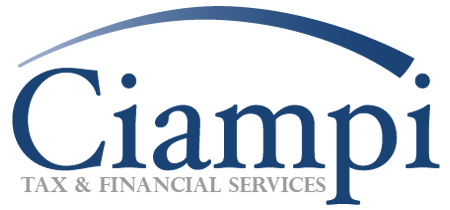Ciampi Tax is transforming. We are excited to preview our new and revitalized Ciampi Tax identity, which visually speaks to our evolution, progress, and growth. We are thrilled to share this with you. Please watch for more changes coming soon.
In This Issue:
- Deferring Taxable Income
- Federal and State Tax Estimates
- Compliance
It’s Never too Late for Tax Planning
It’s hard to believe that we are nearing the last few months of 2022!
For most small and medium businesses, every penny counts. Not only do you want to optimize revenue, but you also need to minimize your tax liability.
The good news is that there is still time to do some year-end tax planning to lower your 2022 federal income tax bill before filing your taxes in 2023. Some areas to review are how your entity is structured, payments to shareholders/partners, and major capital purchases made during the calendar year.

Reducing Taxable Income
As a small business, there are multiple opportunities for a sole proprietorship, partnership, or corporation to reduce taxable income.
The benefit of reducing taxable income is deferment of paying taxes and investing money you would otherwise pay in income taxes into your business.
First, many businesses look at prepaying certain expenses late in December to accelerate their expense deduction and reduce taxable income (Insurance, taxes, rent, etc.).
Another option available to reduce taxable income is to establish and fund a retirement plan that is appropriate with your business and your goals and objectives. Certain retirement plans are required to be established and funded by the end of the calendar year, while others provide greater flexibility for set up and funding until the tax filing deadline (including extensions).
Another opportunity to reduce taxable income is having the business make capital purchases by the end of the year. These purchases can include vehicles, equipment, computers, software, and various other items that can be fully written off in a single year (although you may be on a payment plan for multiple years). These purchases need to be made by December 31, 2022.
Federal and State Estimate Requirements
Although your business may be a partnership or an S Corporation, you may be required to pay both federal and/or state estimates, this amount is an estimate based on what a business owner has made during that quarter. It is very important to make sure you are timely with these payments as the IRS may add interest or penalty charges onto your bill. At this point, some payment dates have already taken place, but it is important to keep them in mind going forward. If you need assistance in calculating your quarterly taxes, please reach out to our office as we will be able to offer you the most accurate figures.
| Federal & State Tax Deadlines |
| Q1 – April 18, 2022 |
| Q2 – June 15, 2022 |
| Q3 – September 15, 2022 |
| Q4 – January 17, 2023 |
Moreover, certain states require the business pay taxes at the corporate level, based upon your income. Please contact us, if you are uncertain of the obligation that may arise due to your entity type and location of your business. Should you be required to make these payments, please be sure that these payments are paid timely and through your state revenue service website to avoid significant penalties. For example, the State of Connecticut would be through myconneCT.

Compliance
Perhaps one of the most controversial pieces of the Inflation Reduction Act is the expansion of the Internal Revenue Service. The primary purpose of the legislation is to boost tax collections through increased audits and other enforcement actions. The expanded funding begins immediately.
There is a compelling case for strengthening the enforcement of existing taxes, rather than creating new ones, to raise tax revenue. In fact, there is a 69% increase in enforcement efforts. The economic costs of enforcing existing taxes are likely lower than the costs of numerous tax increases.
With this immediate expansion of the IRS, audits are likely to increase despite the money supposedly being for wealthy tax evaders and technology. To help remain out of the IRS’ radar, it is important to remain honest and current with your financials. Furthermore, as a business owner, some questions to consider to help remain compliant are:
- How am I defining my workers? Subcontractors or employees?
- Has the company been issuing the proper deliverables?
- Are we filing the appropriate tax returns for Sales and Use Taxes?
- Are all income and expenses clearly labeled?
- Are we over-deducting business expenses?
- Are all sales being reported accurately?
As always, it is helpful to review your individual situation with us to ensure compliance and to help avoid any IRS or state taxing compliance challenges.
How can we help?
All of this can be very overwhelming, but we are here to help!
We are educated and current on the ever-changing tax laws and can propose a viable and appropriate tax strategy to make the most of your individual situation.
Please reach out to us if you have any questions, as we are more than happy to assist you.


